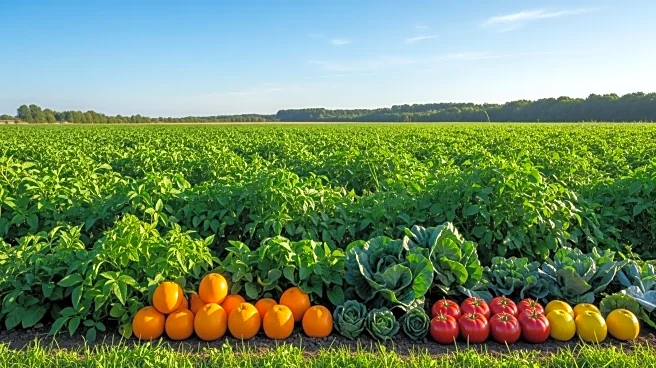What is the story about?
What's Happening?
The global regenerative agriculture market is anticipated to grow significantly, reaching USD 72.21 billion by 2034, driven by increasing consumer demand for sustainable and organic food products. Regenerative agriculture focuses on rebuilding soil health, enhancing biodiversity, and improving water cycles through practices like crop rotation, cover cropping, and reduced tillage. This approach is gaining traction due to rising awareness of environmental issues and government incentives promoting sustainable farming. Major companies, including McDonald's, are investing in regenerative practices to support soil health and water conservation on U.S. cattle ranches.
Why It's Important?
The growth of the regenerative agriculture market reflects a shift towards more sustainable food production methods, which are crucial in addressing environmental challenges such as soil degradation and climate change. By promoting practices that enhance soil health and biodiversity, regenerative agriculture can help mitigate greenhouse gas emissions and improve ecosystem resilience. This market expansion offers economic opportunities for farmers and agribusinesses, as consumer demand for sustainably produced food continues to rise. Additionally, corporate investments in regenerative practices highlight the increasing importance of sustainability in business strategies.
What's Next?
As the market for regenerative agriculture expands, stakeholders are likely to focus on developing standardized practices and verification systems to ensure consistency and reliability in measuring soil health and carbon sequestration. The integration of technology, such as AI and data analytics, will play a crucial role in optimizing regenerative practices and improving farm efficiency. Companies may continue to form partnerships to advance regenerative methods, while governments could introduce more incentives to support sustainable farming initiatives.
Beyond the Headlines
The adoption of regenerative agriculture represents a paradigm shift in farming, emphasizing ecological balance and sustainability. This approach not only addresses environmental concerns but also supports local economies and preserves traditional farming knowledge. As regenerative practices become more widespread, they could lead to significant improvements in food security and nutrition, while fostering biodiversity and resilience against climate variability.
















